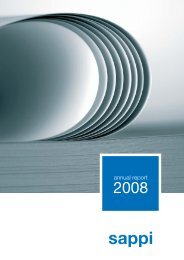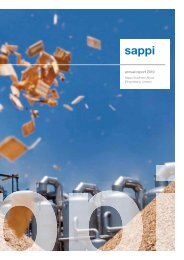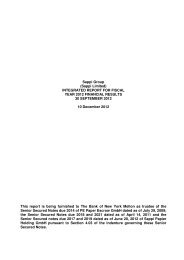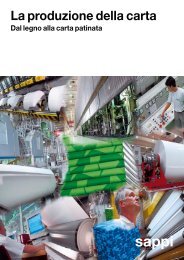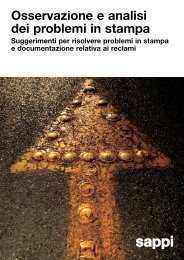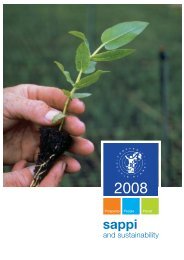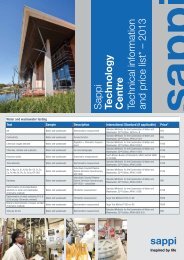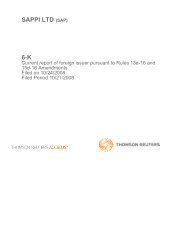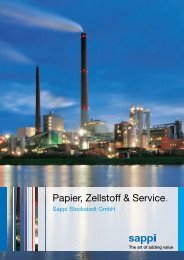2007 Annual Report - Sappi
2007 Annual Report - Sappi
2007 Annual Report - Sappi
You also want an ePaper? Increase the reach of your titles
YUMPU automatically turns print PDFs into web optimized ePapers that Google loves.
33. Events after Balance Sheet date<br />
On 13 November <strong>2007</strong>, the EU Commission took the position that Belgian coordination centres, which are subject to a<br />
specific tax regime in Belgium, had to renew their authorisation during the period February 2003 through to December 2005<br />
without extending the specific tax regime until 31 December 2010. This could impact the tax position of <strong>Sappi</strong> International<br />
SA, our Belgian coordination centre as their authorisation expired before 31 December 2005 and it has been operating under<br />
an extended authorisation until 2010.<br />
At this stage, it is not clear how the Belgian government and/or Forum 187 (an organisation representing about 90% of<br />
Belgian coordination centres) will react and whether they would want to challenge this decision of the EU Commission and<br />
bring the matter in front of the European Court of Justice (ECJ). It should be noted that historically the Commission has<br />
taken controversial positions which have been overruled by the ECJ.<br />
We have reported a contingent tax liability of US$16 million in respect of this issue in note 27.<br />
34. Environmental matters<br />
<strong>Sappi</strong> operates in an industry subject to a wide range of environmental laws and regulations in the various jurisdictions in which<br />
it operates, and these laws and regulations have tended to become more stringent over time. Typically, <strong>Sappi</strong> does not<br />
separately account for environmental operating expenses but does not anticipate any material expenditures related to such<br />
matters. <strong>Sappi</strong> does separately account for environmental capital expenditures. <strong>Sappi</strong> spent approximately US$15 million in<br />
financial year September <strong>2007</strong> (September 2006: US$13 million) on capital projects that control air or water emissions or<br />
otherwise create an environmental benefit. Amounts to be spent in future years will depend on changes to existing<br />
environmental requirements and the availability of new technologies to meet such requirements.<br />
In South Africa, requirements under the National Water Act, National Environmental Management Act and the Air Quality Bill<br />
may result in additional expenditures and/or operational constraints. South Africa is also a signatory of the Kyoto Protocol<br />
and <strong>Sappi</strong> is currently identifying and initiating Clean Development Mechanism projects at a number of our South African mills.<br />
Although we are uncertain as to the ultimate effect on our South African operations, our current assessment of the legislation<br />
is that any compliance expenditures or operational constraints will not be material to our financial condition.<br />
<strong>Sappi</strong> Fine Paper North America is subject to stringent environmental laws in the United States. These laws include the<br />
Federal Clean Air Act, the Clean Water Act, the Resource Conservation and Recovery Act and their respective state<br />
counterparts. In connection with ongoing settlement discussions with government agencies and environmental groups in<br />
Maine, <strong>Sappi</strong> Fine Paper North America plans to remove the Cumberland Mills Dam on the Presumpscot River and over the<br />
next thirty years install fishways at its upstream dams to allow natural migration and promote the restoration of native fish<br />
species to the river. The total cost of these projects is estimated to be approximately US$18 million. The US is a non-signatory<br />
of the Kyoto Protocol, but we closely monitor State and Federal GHG initiatives in anticipation of potential effects, if any, on<br />
our operations.<br />
<strong>Sappi</strong> Fine Paper Europe is subject to extensive environmental regulation in the various countries in which it operates. These<br />
countries are all Member States of the European Union (EU). The vast majority of pertinent environmental legislation is EU<br />
legislation which subsequently are adopted by the Member States into national law. These include the Integrated Pollution<br />
Prevention and Control directive (IPPC) which regulates air emissions, water discharges and defines permit requirements and<br />
best available control techniques (The national European acts regulate the waste framework and restrict the landfills of non-inert<br />
waste to prevent contaminated leachate and methane emissions and the production and use of chemical substances is regulated<br />
by REACH (Registration, Evaluation, Authorisation and Restriction of Chemicals). The European countries in which we operate<br />
are all signatories of the Kyoto Protocol and we have developed a green house gas strategy in line with this protocol.<br />
sappi limited | 07 | annual report 159



